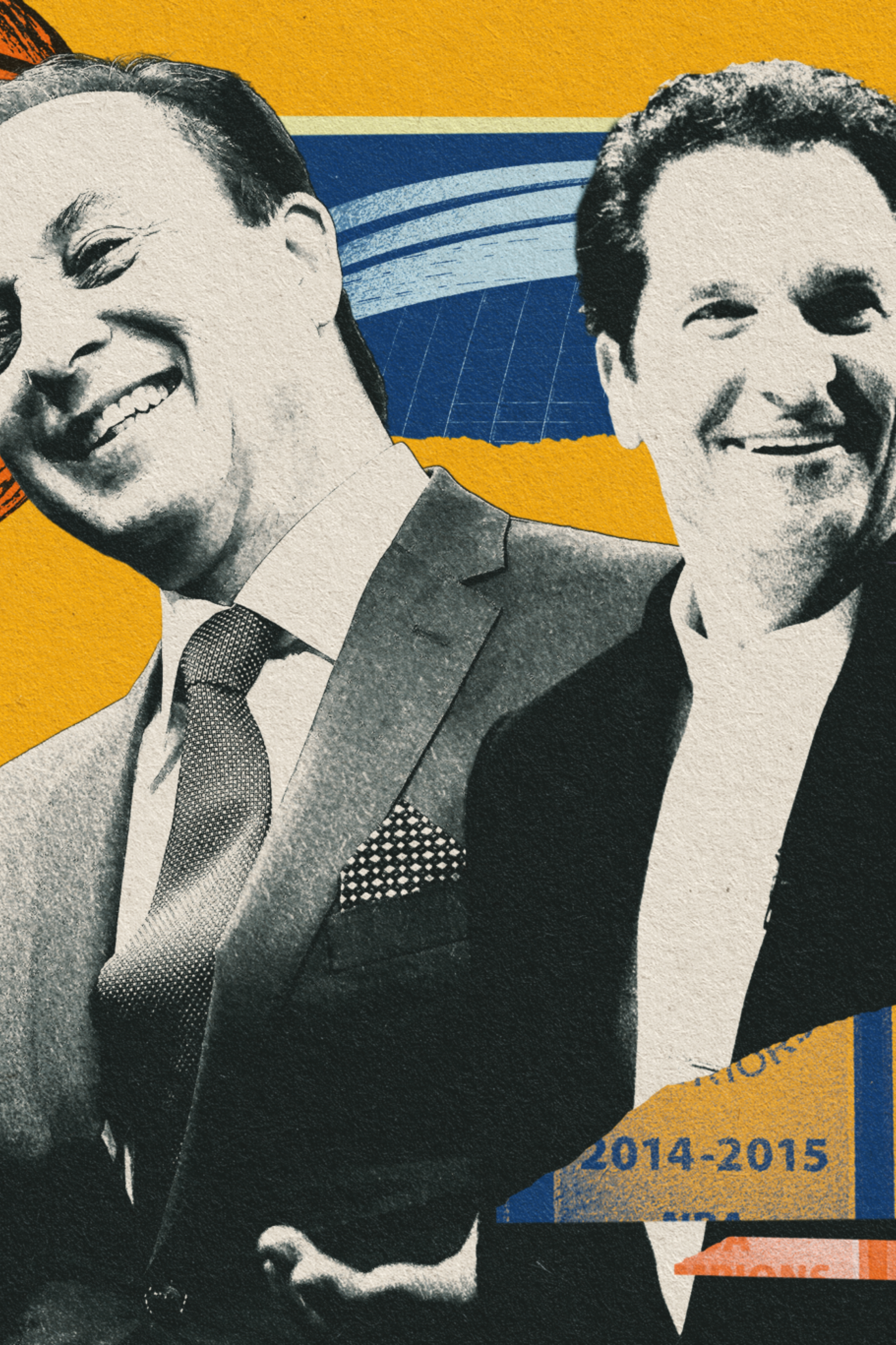Want more ways to catch up on the latest in Bay Area sports? Sign up for the Section 415 email newsletter here and subscribe to the Section 415 podcast wherever you listen.
The Oracle Arena fans booed so loudly, so relentlessly, that Joe Lacob couldn’t get through his speech.
Days after signing off on the trade that sent out fan-favorite Monta Ellis for injured center Andrew Bogut, Lacob was trying to honor the Warriors’ history by retiring Chris Mullin’s jersey. The fans wouldn’t let him.
Mullin himself grabbed the mic and tried to quell the mob, insisting “it’s going to work out just fine.” The crowd was unmoved. Former Warriors legend Rick Barry, instead of lowering the temperature, castigated fans before adding that Lacob “is going to change this franchise.”
Lacob still calls the March 19, 2012, affair the “worst day of my life.” Revisiting that scene now, the attention shifts from the embarrassment of almost 20,000 people booing him to an undeniable fact.
Section 415: Making sense of the Warriors’ uneven start
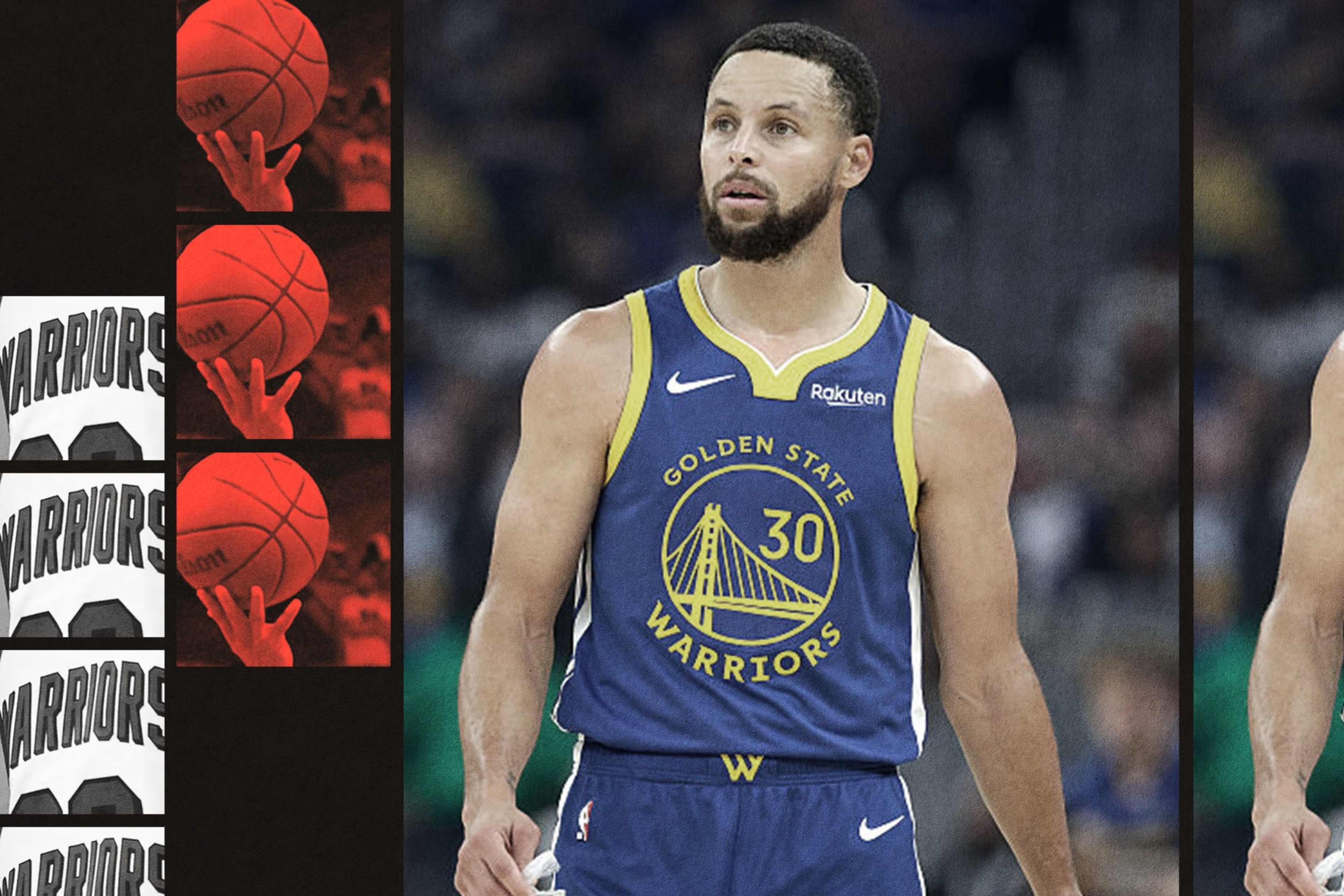
Section 415: How Natalie Nakase turned the Valkyries into an immediate force

Section 415: Tim Kawakami analyzes the 49ers, Giants, and Warriors

Mullin and Barry were right.
Since Lacob and co-owner Peter Guber completed their purchase of the Warriors 15 years ago, on Nov. 12, 2010, the franchise has appeared in six NBA Finals and won four championships. They bought the team for $450 million, and it’s now worth $11 billion, per Forbes’ annual estimate. (opens in new tab) Chase Center, the house that Steph Curry built and Lacob and Guber paid for, is a model for privately funded, mixed-use entertainment venues. The Valkyries — the world’s most valuable women’s sports franchise — are a cherry on top of their portfolio.
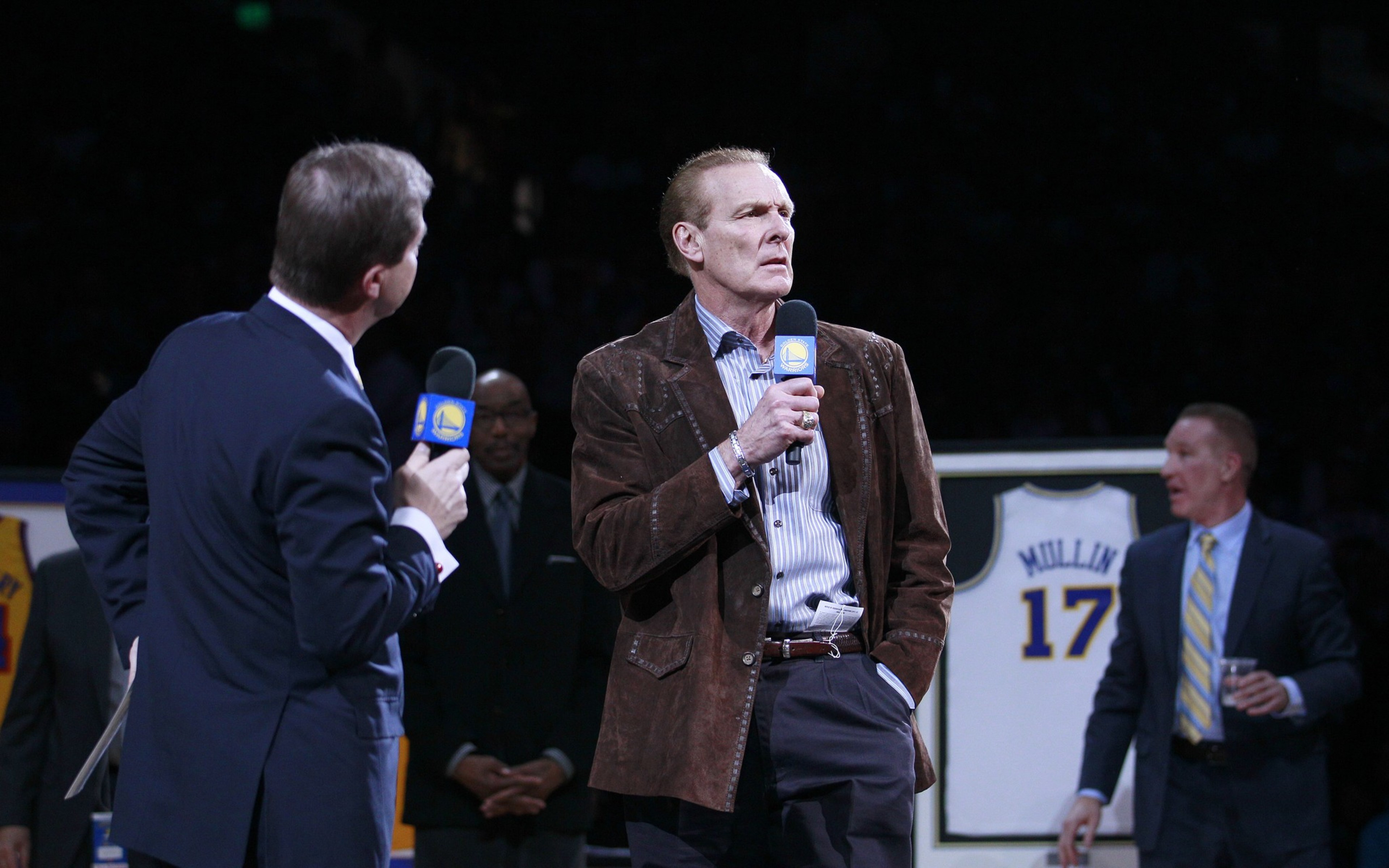
There’s been massive turnover at the NBA’s ownership level over the past 15 years, thanks to skyrocketing franchise values, familial drama, and estate planning, among other reasons. Yet Lacob and Guber’s partnership has remained ironclad despite their vastly different personalities and skills.
“We wanted to build an enterprise,” Guber, 83, told The Standard. “The idea that we have different points of view is an asset, not a liability.”
The 69-year-old Lacob grew up dreaming of owning a team, and he still has dreams. Spoiler alert: none of them involve capitalizing on the fruits of the past 15 years by selling his majority stake in the team. He has never, “not once,” considered that.
“I mean, how could you have more fun than this?” Lacob told The Standard. “I can’t believe these tech guys who make all these billions on AI or whatever it is, and then, I don’t know, they go buy some island and live on an island. Who cares?
“I don’t want to live on some island. I want to do other fun stuff. And fun stuff to me is the world of sports. It’s live entertainment. It’s employing people. It’s creating dreams and making dreams come true.”
‘A remarkable partnership’
Coming to games since the 1980s and raising his family in the Bay Area, Lacob circled the Warriors as his holy grail franchise. But they weren’t the first team he tried to buy.
Lacob met Guber in 2003, when a sports investment banker connected them with billionaire entrepreneur Frank McCourt to try to purchase the Angels from the Walt Disney Corporation. Lacob, who moved to Anaheim as a teenager and hawked peanuts in the stands, was intrigued. The trio advanced through the process and got “very far downstream,” Lacob said, before McCourt proposed pursuing the Dodgers instead.
Lacob’s connection to the Angels made him initially hesitant, but Guber — the Hollywood executive — lived in Los Angeles and was warmer to the idea. They got to the goal line before the trio miscommunicated over how much money each of Lacob, Guber, and McCourt would put into the deal.
In recalling the story, Lacob pinches his pointer finger and thumb together. They were this close to buying the Dodgers. It was a formative experience for Lacob. He says the failed attempt taught him who he could and couldn’t work with.
He also learned how well he meshed with Guber, who possesses a vastly different skill set. Guber’s easy charisma spills out through his metaphors and turns of phrases (“Our attitude leads our aptitude”; “Feet, tongue, heart, and wallet going in the same direction”). Lacob, meanwhile, is a direct conversationalist. Guber’s a storyteller, Lacob an industrialist.
So in 2010, when the Warriors came up for sale, Lacob’s first call was to Guber. He didn’t need the money necessarily, but he valued having a partner to collaborate with.
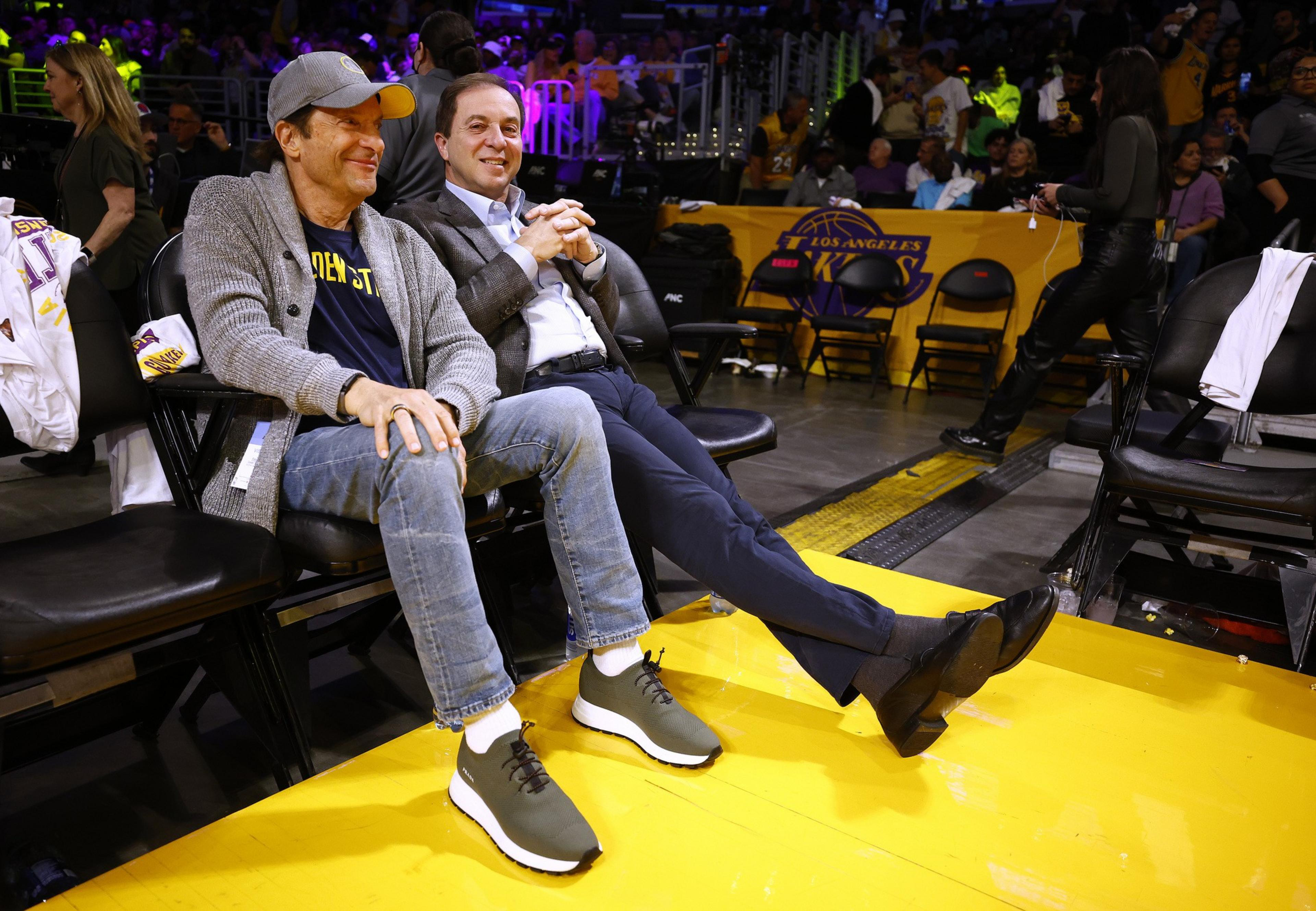
“It’s impossible to talk about Joe without talking about Peter Guber, too,” former team president Rick Welts said.
They complement each other, relying on mutual respect and their distinct areas of expertise to sort through differences of opinion.
Lacob operates front-and-center, Guber more in the background. Lacob cut his cloth in Silicon Valley, Guber’s films have earned dozens of Academy Award nominations. Lacob’s more hands-on with basketball decisions. Guber, the entertainer, is known to spend hours reviewing the team’s introductory videos that play before home tipoffs.
“Peter’s such a great person,” Lacob said. “And part of it is, just, we were very fortunate that we found each other in life. As he likes to say, two Jewish guys from Boston…I can tell you that it’s been a remarkable partnership.”
Fans at the top
As the Warriors dynasty tore through the 2010s and extended into this decade with the 2022 championship, more than half of NBA teams — including storied franchises such as the Celtics and Lakers — have changed hands.
At this level, business partnerships rarely last. Lacob and Guber have been an exception.
“Ownership continuity is critically important, and we clearly see the benefits in San Francisco,” NBA commissioner Adam Silver said via email.
Lacob and Guber were in lockstep since Day 1. They believed successful franchises need active owners, that moving out of the oldest arena in the league was necessary, and that the Warriors — despite missing the playoffs in 16 of the prior 17 seasons — were actually a sleeping giant.
“I don’t think in that first meeting, I ever heard either one of them use the word, ‘good,’” Welts said. “They only used the word, ‘great.’”

The plans they initially pitched to Welts have been realized and then some. At the core of their success is a genuine passion. Every time Lacob walks into the $1.4 billion Chase Center, he feels a sense of pride.
That’s been the case even in the down years, even amid fan backlash. The morning after the 2012 Mullin jersey retirement debacle, Lacob joined a local radio show unprompted to explain his perspective.
Said Welts: “I don’t know what other owner would’ve jumped on talk radio the next morning to say, ‘Look, I get it. This isn’t good enough. I want to win as much as you do, and we’re going to do it. I know why you’re feeling this way. Bring it on.’ And to me, that in a nutshell is who he is.”
Some owners inherit their teams. Some are content to rake in revenue while neglecting their rosters. Some cycle through coaches and executives. Some are spread too thin with their other endeavors. Some hijack the basketball operations department. Some let their arenas fall apart or demand taxpayer money to build their next home.
The Warriors owners, as Guber likes to say, have kept the main thing the main thing. That means pursuing championships.
“When the Lakers sold for $10 billion, everyone looks at me,” said Lacob, “‘You could get more — [you have] 60% more revenues, you own your arena and they don’t, you own the Valkyries and they don’t.’ I mean, arguably, we’re worth 15, 18 billion. Just if you were to look at the metrics. I don’t care. I don’t care if it’s $25 billion. It doesn’t matter to me.”
In Lacob’s eyes, a courtside seat has a better view than any island could offer.
What’s next?
Relaxed in a black Warriors hoodie, Lacob starts doing the math in his head.
“The greatest owner in NBA history was Jerry Buss,” Lacob said. “Thirty-three years, 16 Finals.”
This is the topic that gets the Warriors’ CEO animated. Lacob always prefers looking ahead.
To catch the hallowed Lakers owner, the Warriors would need to make 10 Finals trips in the next 18 seasons. Lacob realizes that more parity in the modern NBA, coupled with an apron system designed to dull the power of perennial top spenders (like the Warriors), adds to the challenge.
But Lacob can’t help himself. He has the same kind of “irrational confidence” — Steph Curry’s phrase — now as he had 15 years ago when he assumed the post.
“I would love to continue our success post the Steph Curry era,” Lacob said. “He has a lot to do with this, no question about it. There’s a part of me that wants to be really successful on the second iteration, when Curry’s gone. So that’s something to think about.”
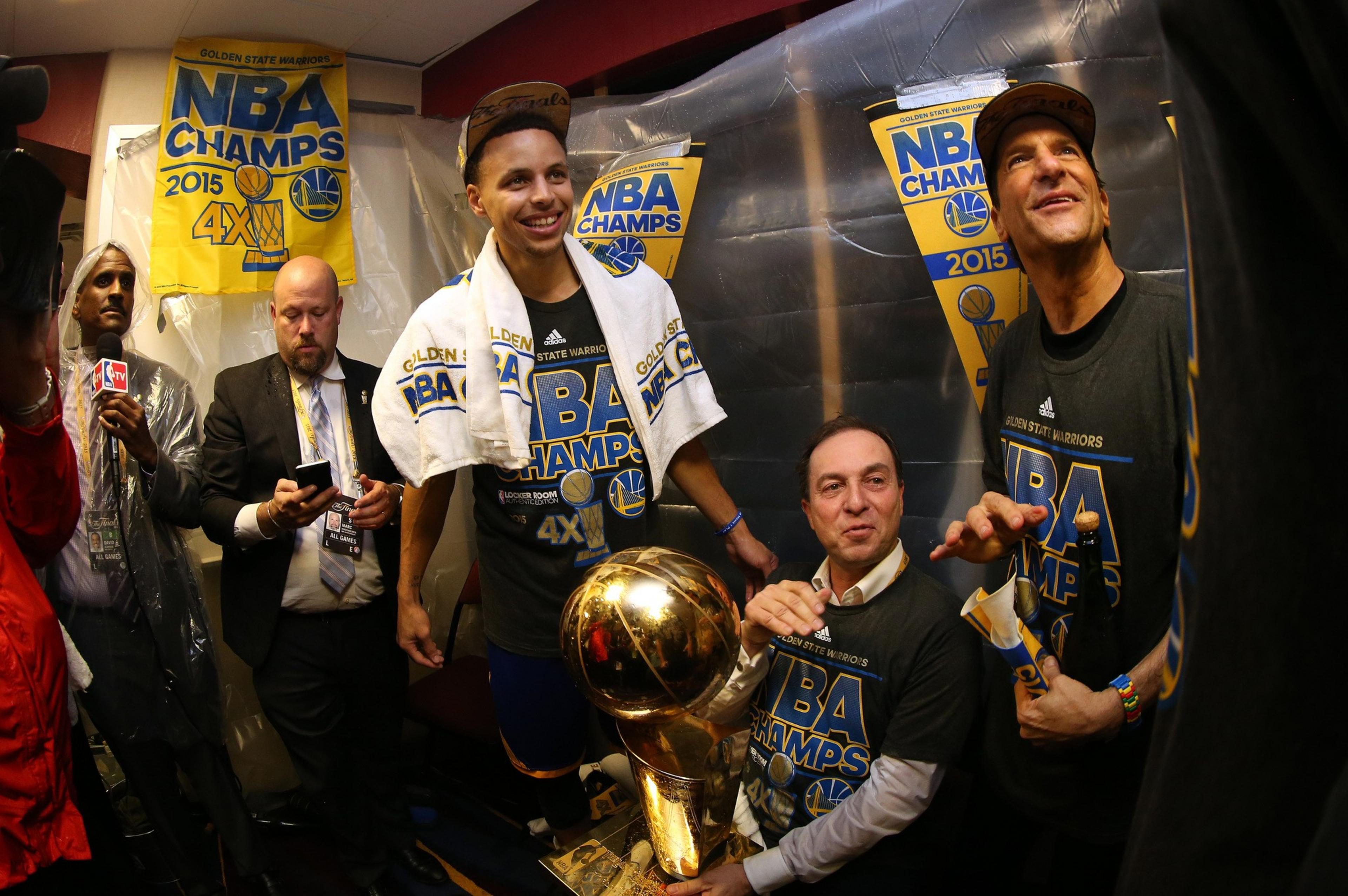
To be sure, none of the past 15 years — not the championships, not the valuation, not even Chase Center — is possible without Curry. No matter how business-savvy Lacob is or how creative Guber might be, they struck gold by inheriting one of the greatest players ever. The Warriors never had to do a capital call from investors to build the Chase Center, Lacob said, in large part because of the revenues generated from Curry’s dynastic teams in the 2010s.
“They thank me a lot,” Curry said. “I thank them, too. It’s mutual. It’s a mutual, obviously, admiration for what we’ve all been able to do.”
It’d take a “light-years (opens in new tab)” level of hubris to be confident in winning without Curry. But the blueprint of at least having a chance to be competitive is there, and Lacob has followed it. Under his governorship, the Warriors have spent by far the most money on payroll leaguewide, paying the luxury tax in nine of the past 11 seasons.
And as Curry points out, one of Lacob’s greatest strengths is surrounding himself with talented people. One of his first hires was Jerry West, a signal that the organization was serious about winning. He hired and promoted Bob Myers, greenlit the coaching change from Mark Jackson to Steve Kerr — against Curry’s public wishes — and empowered dozens of business people who have helped build a culture beyond the court, including with a philanthropic arm, The Golden State Community Foundation (opens in new tab), that just surpassed $50 million in cumulative impact. (opens in new tab)

Lacob is “definitely interested” in the idea of buying another franchise, maybe in MLB or the NHL, but has already passed up one lucrative opportunity. Back in 2012, as fans booed Lacob out of the Oracle Arena spotlight, the Dodgers were up for sale again.
McCourt, having won the 2004 bid for the team, was selling the franchise in a state of bankruptcy. Guber, part of the Guggenheim group that ultimately won the bid, gauged Lacob’s interest in joining the consortium.
It was a chance to buy low on one of the most legendary franchises in sports. But Lacob knew that if he joined the Dodgers ownership group, Warriors fans would look at him differently because of the Giants’ historic rivalry with Los Angeles.
The group with Guber ultimately purchased the Dodgers for a record $2.15 billion. The team’s worth more than triple that now, and has collected three more World Series trophies. But Lacob insists money’s not the main priority.
“This is about winning,” Lacob said. “This is about chasing dreams and making them happen. This is about employing a lot of people who love their jobs and love working here. This is about having a fan base that hopefully doesn’t hate you. You know? Nobody likes that.”
